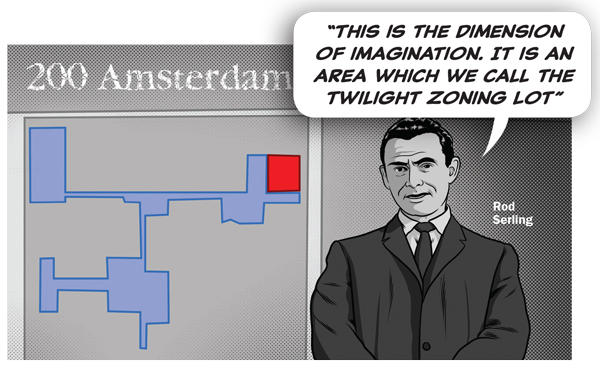The ruling to shorten 200 Amsterdam may not ultimately force SJP Properties to deconstruct nearly half of the nearly complete building, but it has already ended the use of gerrymandered zoning lots to boost building heights.
 In 2017, SJP Properties and Mitsui Fudosan America secured approval to erect a 668-foot condominium building at 200 Amsterdam Avenue based on a convoluted zoning lot 10 times the size of the building’s actual footprint.
In 2017, SJP Properties and Mitsui Fudosan America secured approval to erect a 668-foot condominium building at 200 Amsterdam Avenue based on a convoluted zoning lot 10 times the size of the building’s actual footprint.
 Locals swiftly mobilized against the planned tower, led by Olive Freud’s Committee for Environmentally Sound Development, and joined by Manhattan Borough President Gale Brewer and City Council member Helen Rosenthal.
Locals swiftly mobilized against the planned tower, led by Olive Freud’s Committee for Environmentally Sound Development, and joined by Manhattan Borough President Gale Brewer and City Council member Helen Rosenthal.
 In early February, SJP’s Steve Pozycki claimed that, despite the noisey opposition, most of the buyers for the condo tower were actually UWS neighbors. But Freud was skeptical.
In early February, SJP’s Steve Pozycki claimed that, despite the noisey opposition, most of the buyers for the condo tower were actually UWS neighbors. But Freud was skeptical.
 About a week after Pozycki’s boast, State Supreme Court Justice Franc Perry ordered SJP to remove about 20 floors from the tower to bring it into compliance with local zoning limits.
About a week after Pozycki’s boast, State Supreme Court Justice Franc Perry ordered SJP to remove about 20 floors from the tower to bring it into compliance with local zoning limits.
 Soon after the shock ruling, City Council member Ben Kallos called for Gamma Real Estate’s 847-foot condo tower at 3 Sutton Place to be shortened by more than half, since Gamma used a similar tactic to win approval.
Soon after the shock ruling, City Council member Ben Kallos called for Gamma Real Estate’s 847-foot condo tower at 3 Sutton Place to be shortened by more than half, since Gamma used a similar tactic to win approval.
 The de Blasio administration’s reaction to the ruling was somewhat schizophrenic, with the Department of Buildings announcing that it would no longer allow the sort of zoning lots exploited by SJP and Gamma to boost tower heights, while the Law Department appealed Perry’s ruling.
The de Blasio administration’s reaction to the ruling was somewhat schizophrenic, with the Department of Buildings announcing that it would no longer allow the sort of zoning lots exploited by SJP and Gamma to boost tower heights, while the Law Department appealed Perry’s ruling.
